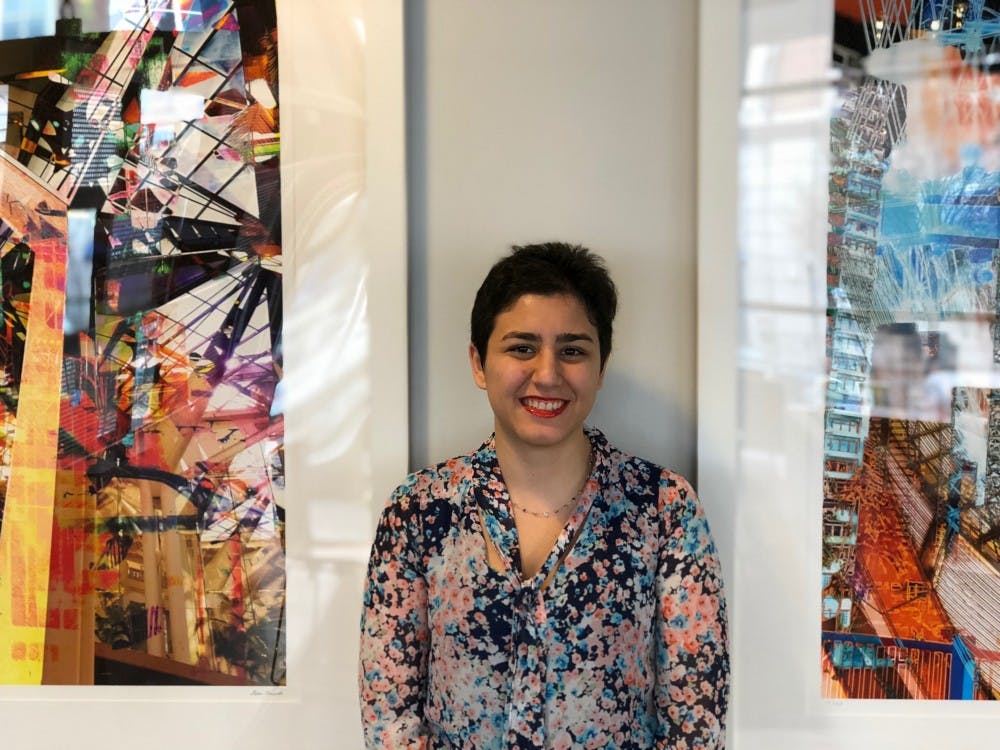Senior Alaleh Azhir was named a Rhodes Scholar in November, becoming one of 32 American students to receive the prestigious international postgraduate award.
The Rhodes Scholarship selects applicants on the basis of academic excellence, leadership and service. It rewards recipients with full funding to study at the University of Oxford in England.
Immigrants and first-generation Americans comprise half of the winners this year. Azhir, who moved to the U.S. from Iran when she was 14, is one of them. She shared her experiences as an immigrant with The News-Letter.
“Iran gave me a really good foundation in math and science, which helped me when I came here,” she said. “I couldn’t communicate as well as the other students, so I was drawn more to mathematics.”
She was surprised by the plethora of opportunities available to her when she first came to the U.S.
“Triple majoring is an example of my being overly excited about the opportunities here and wanting to take advantage of it all,” she said.
Azhir didn’t originally plan to triple major. She started off as a Biomedical Engineering (BME) major but then said she fell in love with Computer Science, with her focus on computational biology. Azhir noted that earning an Applied Math and Statistics degree would only take two extra class. Azhir took 24 credits last semester, which she said she managed by having a good support system. Although she has loved all of her professors, one of her favorite classes at Hopkins has been Systems Bioengineering Lab, in which students make a frog’s heart beat outside of its body.
At Oxford, Azhir will begin pursuing a master’s degree in women’s and reproductive health — she believes it is the ideal program for her diverse interests. She had applied to multiple fellowships in the U.K., knowing that she wanted to study abroad before going to medical school. She is grateful for the opportunity to acquire two more years of research experience, which she believes will prepare her for a career in academic medicine. She discussed how the World Health Organization and other public health organizations have found that women who have difficult pregnancies are more likely to develop heart problems later on in life. She plans to use data collected by the U.K.’s National Health Service (NHS) to explore this correlation at Oxford.
“We want to see what the link is there. Can we predict which women will have heart problems, and if we can predict it, can we prevent it?” she said.
She explained that health-care data between hospitals currently isn’t being shared, which means that studies aren’t being done to explore risk factors for harmful conditions.
“Right now, what we have in the United States is more of reactive medicine. You get sick, and then you go see a doctor, but the field is moving toward more of a preventive method,” she said. “You go for a check-up, and then if you are likely to get certain diseases, we will do earlier intervention so that you don’t develop those conditions.”
She hopes that by the time she graduates, the price of genomic sequencing will be low enough that genomic data will be used along with other health-care data.
Azhir is also interested in the humanities. She is a Bioethics minor and part of Prometheus, the philosophy journal on campus. She expressed the value in looking at medical questions with people from a variety of backgrounds.
“This semester I’ve been taking more Bioethics and Sociology courses, and I’m just in awe of how different disciplines can look at the same problem and come up with very different solutions,” she said. “In BME, to treat a disease, you learn one correct medical solution and the science behind why a treatment works, but in Bioethics, you ask if it’s ethical and how to incorporate patients’ autonomy and rights. The discussions are very interesting and intriguing.”
Outside the classroom, Azhir is the creative chair of Art Brigade and designs crafts with elementary school students in underserved communities. She is also involved with Cooking 4 Love; she helped cook food for victims of domestic abuse and collaborated with Remington Outreach to cook food for students receiving homework help.
Azhir has enjoyed giving back to the community. Additionally, according to Azhir, the University’s National Fellowships Program (NFP) helped make her a viable candidate for Rhodes. She advised future applicants to take advantage of the NFP, whose members spent the summer helping her revise her essays.
“The first day that I interviewed with them... I was very shy,” she said. “My courage built up over time.”
She also addressed the fact that many Rhodes scholars this year are immigrants.
“It shows the diversity of the U.S. as a country and how it allows immigrants to come here, flourish,” she said. “That just shows the beautiful part of America as a country of immigrants.”





